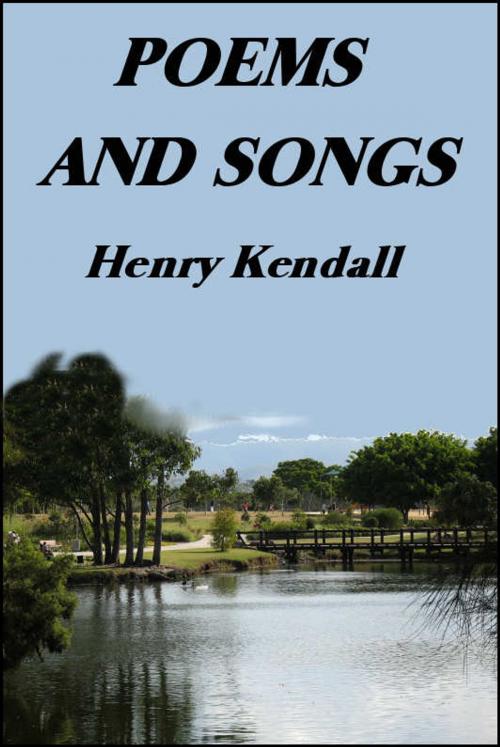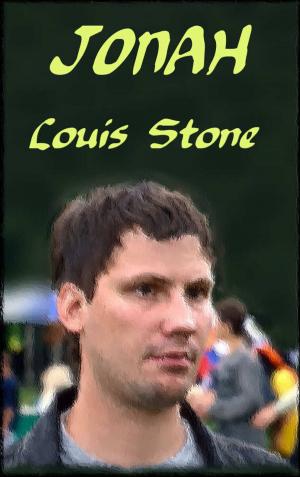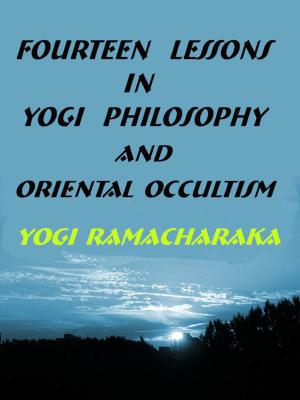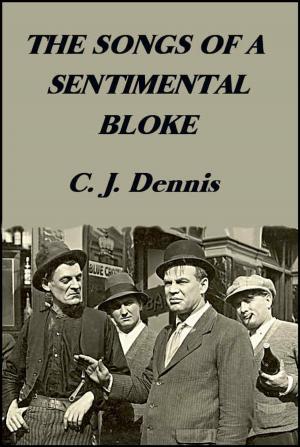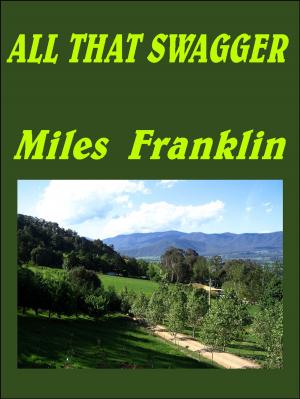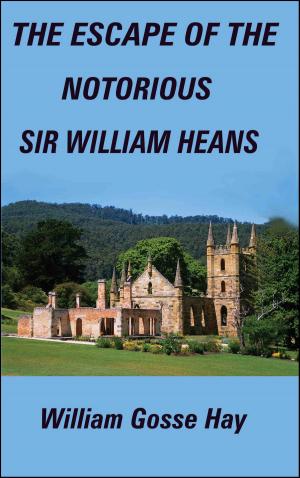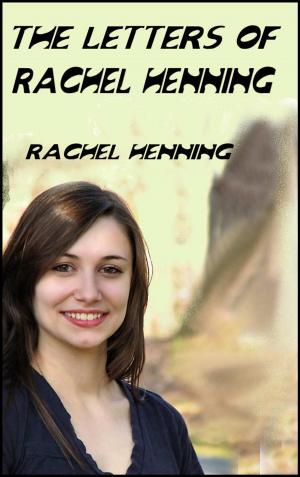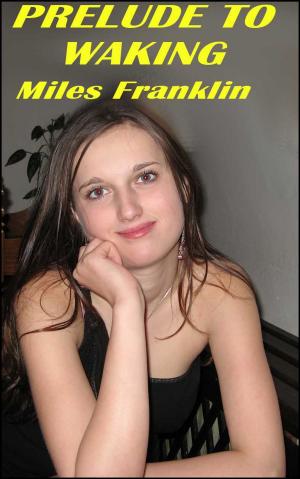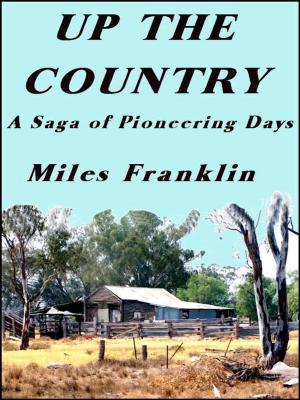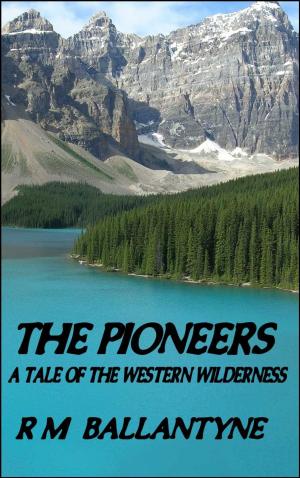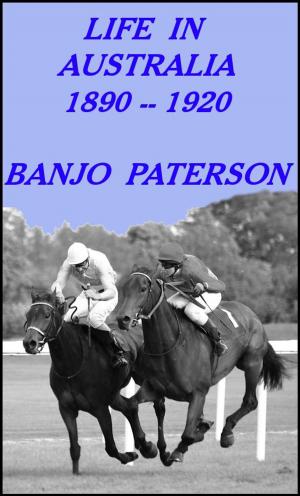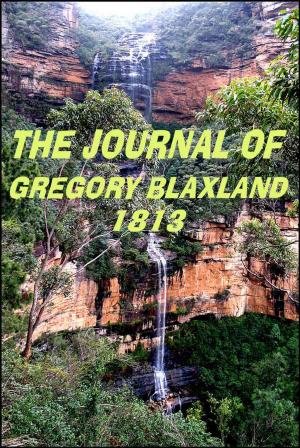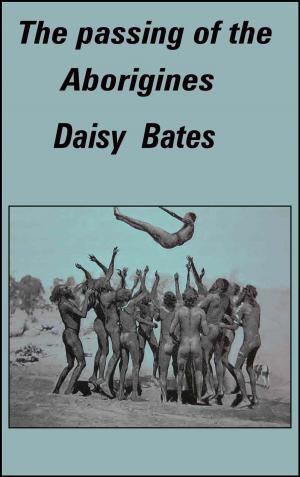| Author: | Henry Kendall | ISBN: | 1230000107411 |
| Publisher: | Download eBooks | Publication: | February 16, 2013 |
| Imprint: | Language: | English |
| Author: | Henry Kendall |
| ISBN: | 1230000107411 |
| Publisher: | Download eBooks |
| Publication: | February 16, 2013 |
| Imprint: | |
| Language: | English |
Kendall was born near Ulladulla, New South Wales. His three volumes of verse were all published under the name of "Henry Kendall". He received only a slight education. When he was 15 he went to sea with one of his uncles and was away for about two years. Returning to Sydney when 17 years old he found his mother keeping a boarding-school; it was necessary that he should do something to earn a living, and he became a shop-assistant. He had begun to write verses and this brought him in contact with two well-known verse writers of the day, Joseph Sheridan Moore who published a volume of verse, Spring Life Lyrics, in 1864, and James Lionel Michael. Michael, who was a solicitor, took Kendall into his office and gave him the run of his library. He removed to Grafton in 1861 and Kendall was again employed by him for about six months during the following year.
Kendall made another friend in Henry Parkes, who was editing The Empire from 1850 to 1857 and published a few of his youthful verses. In 1862 he sent some poems to the London Athenaeum which printed three of them and gave the author kindly praise. In the same year his first volume, Poems and Songs, was published at Sydney. It was well received and eventually the whole edition of 500 copies was sold. Representations were made to the government, and in 1863 a position was found for the poet in the lands department. He was transferred to the colonial secretary's department in 1864 and appears to have discharged his duties in a conscientious way; his hours were not long and he had some leisure for literature.
In 1868 he married Charlotte Rutter, the daughter of a Sydney physician, and in the following year resigned from his position in the government service and went to Melbourne, which had become a larger city than Sydney and more of a literary centre. Kendall's decision to give up his position must at the time have seemed very unwise. But he had become financially embarrassed before his marriage on account of the extravagance of his family, and his wife found it impossible to live with his mother who had joined the young couple.
The elder Mrs Kendall was in fact a heavy drinker, Kendall felt that the only chance of happiness for himself and his wife was to make a fresh start in another city. He was well received by his fellow writers, George Gordon McCrae, Marcus Clarke, Adam Lindsay Gordon and others, but Kendall had none of the qualities of a successful journalist, though some of his work was accepted by the press and George Robertson published his second volume, Leaves from Australian Forests, soon after his arrival. The poem 'Bell-Birds', one of Australia's best-known poems, was published in that volume.
The poet found that he could not make a living by literature and, probably by the good offices of George Gordon McCrae, a temporary position was found for him in the government statist's office. Kendall, however, had no head for figures. He did his best but found his tasks hopeless. One day McCrae was called out into the passage to see Kendall, an agitated, trembling figure who told him he must go, he could not stand it any longer.
Kendall had indeed lost heart; he drifted into drinking and Alexander Sutherland in his essay draws a lurid picture of the depths into which the poet had fallen. It is true that he had the authority of Kendall's poem "On a Street", but years afterwards George Gordon McCrae said that Kendall "made the worst of everything including himself". McCrae had no doubt about Kendall having at times given way to excessive drinking, but stated positively that he had never actually seen him the worse for drink.
Unable to support his family, he was forced back to Sydney by poverty, ill health and drunkenness. Intervals of dogged literary effort alternated with lapses into melancholia. His wife had to return to her mother and Kendall became a derelict; in early 1873 he spent four months in the Gladesville Hospital for the Insane. In 1873 Kendall was taken in by the Fagan brothers, timber merchants near Gosford, and was afterwards given a position in the business of one of the brothers, Michael Fagan, at Camden Haven. There he stayed six years and found again his self respect.
In 1880 he published his third volume, Songs from the Mountains. The volume contained a satirical poem on a politician of the day and had to be withdrawn under threat of a libel action. The original edition is now very rare, but the volume, reissued with another poem substituted, sold well and the poet made a profit of about £80 from it. In 1881 his old friend Sir Henry Parkes had him appointed inspector of state forests at a salary of £500 a year. But his health, never strong, broke down, he caught a severe chill, developed consumption, and died at Redfern in Sydney on 1 August 1882. He was buried in Waverley Cemetery.
Kendall was born near Ulladulla, New South Wales. His three volumes of verse were all published under the name of "Henry Kendall". He received only a slight education. When he was 15 he went to sea with one of his uncles and was away for about two years. Returning to Sydney when 17 years old he found his mother keeping a boarding-school; it was necessary that he should do something to earn a living, and he became a shop-assistant. He had begun to write verses and this brought him in contact with two well-known verse writers of the day, Joseph Sheridan Moore who published a volume of verse, Spring Life Lyrics, in 1864, and James Lionel Michael. Michael, who was a solicitor, took Kendall into his office and gave him the run of his library. He removed to Grafton in 1861 and Kendall was again employed by him for about six months during the following year.
Kendall made another friend in Henry Parkes, who was editing The Empire from 1850 to 1857 and published a few of his youthful verses. In 1862 he sent some poems to the London Athenaeum which printed three of them and gave the author kindly praise. In the same year his first volume, Poems and Songs, was published at Sydney. It was well received and eventually the whole edition of 500 copies was sold. Representations were made to the government, and in 1863 a position was found for the poet in the lands department. He was transferred to the colonial secretary's department in 1864 and appears to have discharged his duties in a conscientious way; his hours were not long and he had some leisure for literature.
In 1868 he married Charlotte Rutter, the daughter of a Sydney physician, and in the following year resigned from his position in the government service and went to Melbourne, which had become a larger city than Sydney and more of a literary centre. Kendall's decision to give up his position must at the time have seemed very unwise. But he had become financially embarrassed before his marriage on account of the extravagance of his family, and his wife found it impossible to live with his mother who had joined the young couple.
The elder Mrs Kendall was in fact a heavy drinker, Kendall felt that the only chance of happiness for himself and his wife was to make a fresh start in another city. He was well received by his fellow writers, George Gordon McCrae, Marcus Clarke, Adam Lindsay Gordon and others, but Kendall had none of the qualities of a successful journalist, though some of his work was accepted by the press and George Robertson published his second volume, Leaves from Australian Forests, soon after his arrival. The poem 'Bell-Birds', one of Australia's best-known poems, was published in that volume.
The poet found that he could not make a living by literature and, probably by the good offices of George Gordon McCrae, a temporary position was found for him in the government statist's office. Kendall, however, had no head for figures. He did his best but found his tasks hopeless. One day McCrae was called out into the passage to see Kendall, an agitated, trembling figure who told him he must go, he could not stand it any longer.
Kendall had indeed lost heart; he drifted into drinking and Alexander Sutherland in his essay draws a lurid picture of the depths into which the poet had fallen. It is true that he had the authority of Kendall's poem "On a Street", but years afterwards George Gordon McCrae said that Kendall "made the worst of everything including himself". McCrae had no doubt about Kendall having at times given way to excessive drinking, but stated positively that he had never actually seen him the worse for drink.
Unable to support his family, he was forced back to Sydney by poverty, ill health and drunkenness. Intervals of dogged literary effort alternated with lapses into melancholia. His wife had to return to her mother and Kendall became a derelict; in early 1873 he spent four months in the Gladesville Hospital for the Insane. In 1873 Kendall was taken in by the Fagan brothers, timber merchants near Gosford, and was afterwards given a position in the business of one of the brothers, Michael Fagan, at Camden Haven. There he stayed six years and found again his self respect.
In 1880 he published his third volume, Songs from the Mountains. The volume contained a satirical poem on a politician of the day and had to be withdrawn under threat of a libel action. The original edition is now very rare, but the volume, reissued with another poem substituted, sold well and the poet made a profit of about £80 from it. In 1881 his old friend Sir Henry Parkes had him appointed inspector of state forests at a salary of £500 a year. But his health, never strong, broke down, he caught a severe chill, developed consumption, and died at Redfern in Sydney on 1 August 1882. He was buried in Waverley Cemetery.
